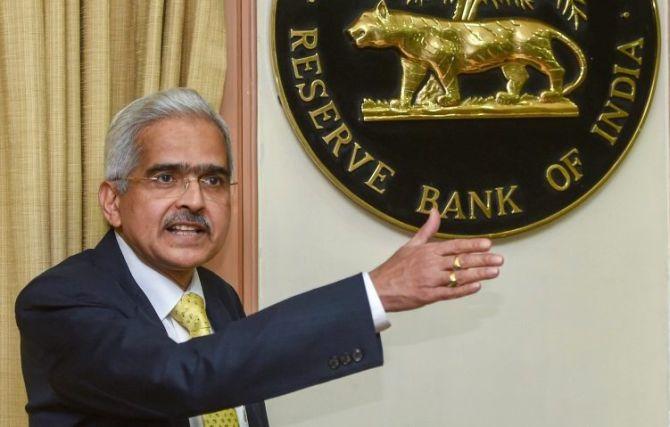RBI says haste in easing norms for banks harmful to economy.
Abhijit Lele reports.

Rebuffing demands for easing regulatory norms for banks, the Reserve Bank of India on Friday warned that any haste in relaxing rules for capital adequacy and risk weights when defaults were high and provisions low was harmful for the economy.
In the first report Trend and Progress of Banking in India 2017-18 under new Governor Shaktikanta Das, the RBI said the Basel III norms recommended risk weights for various credit exposures, based on cumulative default rates (CDR) and recovery rates observed internationally.
However, CDRs and loss-given default (LGD) rates seen in India are much higher than observed internationally, the RBI said in its first report.
Therefore, applying Basel-specific risk weights would understate the true riskiness of loan assets carried on the books of the Indian banks.
Moreover, the current levels of the provisions maintained by banks may not be enough to cover the expected losses.
In particular, the adequacy of buffers becomes an important issue in order to absorb the expected losses that have not been provided for.
It is not that the RBI has been unresponsive to demands for tweaking norms. It gave one more year for implementing the last tranche of 0.625% under the capital conservation buffer (CCB) -- up to March 31, 2020.
The RBI, however, retained the capital adequacy requirement for banks at 9%.
The RBI said it needed to be recognised that the Indian banking system had a high proportion of un-provided bad loans vis-à-vis the capital levels although after the Insolvency and Bankruptcy Code and revised framework for resolving assets, there were signs of improvement in defaults rates and recovery rates.
Citing this, there have been calls for reducing the regulatory capital requirements.
Against the foregoing however, the case for recalibration of risk weights or minimum capital requirements would need to be carefully assessed.
Frontloading regulatory relaxations before the structural reforms fully set in and conclusive evidence on CDRs and LGDs is observed could be detrimental to the interests of the economy, the RBI asserted.
The government has infused capital in public sector banks intermittently. In the last three years (2015 to 2018), however, more than 70% of the infused capital was absorbed into losses incurred by them.
This suggests only if the recapitalisation amount was large enough relative to the capital base, it can make a perceptible impact on credit growth, it added.
As for prompt corrective action (PCA), it said the RBI's PCA framework was on the lines of the US-PCA framework. But, the threshold of the latter is based only on capital whereas in India, in addition, asset quality and profitability indicators are also tracked.
The additional parameters are essential in the Indian context because banks here have maintained low provision coverage ratios and have large expected losses which are not provided for.
As a result, the current level of capital does not capture the additional capital requirement on account of expected future loan losses.
Elaborating the unfinished reforms in banking, the RBI said the growing size and complexity of the Indian financial system would warrant strengthening corporate governance systems in banks.
The yet to be implemented recommendations of the P J Nayak committee on banks's governance include incorporating PSBs in the Companies Act.
Their ownership has to be transferred from the central government to a Bank Investment Company.
The Bank Boards Bureau is yet to be entrusted with the responsibility of appointment of non-official directors, the RBI added.
Unfinished agenda
- Implementation of P J Nayak Committee recommendations
- Setting up a Bank Investment Company
- The Banks Board Bureau will appoint non-official directors
- Legislation to do away with RBI nominees in PSB boards
- Performance evaluation system for PSBs
- Review of compensation guidelines for whole-time directors of private banks












 © 2025
© 2025